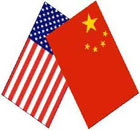Government and Policy
Xinjiang to implement amended public security measures
(Xinhua)
Updated: 2010-01-06 23:56
 |
Large Medium Small |
URUMQI:Northwest China's Xinjiang Uygur Autonomous Region is to implement amended public security provisions as of February 1 to crack down on crimes that threaten the national security.
The revised regulations put the crackdown on the "three evil forces" and other crimes threatening the national security as the top task to maintain public order, in a bid to safeguard national unity, ethnic solidarity and social stability.
According to Imibakhi, the occurrence of separatist and terrorist activities, especially the July 5 riot in Urumqi last year, in Xinjiang in recent years exposed the true nature of the "three evil forces" as being violent and terror. At the same time, they also reflected loopholes in the measures to maintain public order.
The regional People's Congress revised relevant regulations to safeguard the fundamental interests of the people, he said.
The new amendment to the local public security regulations was made on the basis of the revised version in 1997. The regulations were first approved by the regional People's Congress in 1994.












